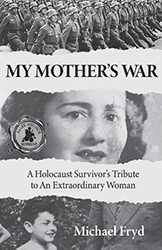In the Tel Aviv of the 1950s, amid a mosaic of cultures and languages that had come together in the fledgling Jewish state, a newly arrived Polish immigrant named Dora Blaustein Libeskind served a unique role: she made brassieres for the wives of the political elite. It seems that during this period of Israel’s history, known as yemei hatzena—the humble days — when many people did not know where their next meals were coming from, a certain class of women wanted undergarments made with attention to detail and European craftsmanship. Lucky for them, Mrs. Libeskind worked as a bra-maker in Łódź before arriving in Israel in 1957.
This charming little tidbit is one of many revealed by her daughter, Annette Libeskind Berkovits, in her latest memoir. The book recounts Annette’s childhood, from her parents’ return to Lodz after exile in Kyrgyzstan when she was three years old, to her Jewish upbringing in postwar cosmopolitan Poland in the early 1950s, to their brief but memorable life in Israel on Kibbutz Gevat and then in Tel Aviv, and, finally, to their immigration to New York when Annette was sixteen years old. The book ends with Annette’s astounding graduation from the elite Bronx High School of Science, a remarkable feat for a girl who did not know a word of English just two years before.
Now a well-regarded scientist, educator, and conservationist, Berkovitz offers a rich portrait of the tumultuous worlds in which she lived. She describes the inner life of fellow teenagers on the kibbutz, who dealt with the controversial children’s house, group meals, farming work, and the first stirrings of love. She recounts Israel’s tenth anniversary, when she danced on the Tel Aviv streets with strangers, one of whom became her first boyfriend. And she recalls being caught in cultural clashes between “sabras” and immigrants.
Most evocative are Berkovitz’s depictions of her mother, who was a strong, determined, and fiercely independent woman, far ahead of her time. Her niche tailoring skills supported the family in Poland so well that they had nannies, an indoor toilet, lace and ceramic fineries, and vacations. She also supported the family for two years in Tel Aviv — despite the language barrier and cultural disadvantages — while her husband struggled to find a job. His inability to secure work eventually brought them to New York, where the advent of department stores with cheap, mass-made undergarments meant that there was no demand for her skillset. Although Mr. Libeskind was finally able to work, Mrs. Libeskind’s career was never quite the same. Berkovitz mourns the loss of her mother’s persona almost as much as she pines for her former life in Israel.
Aftermath is a stunning book about an era that had a deep impact on Jewish history.
Dr. Elana Sztokman is a Jewish feminist anthropologist, educator, activist, and author, and two-time winner of the National Jewish Book Council Award. Her most recent book is When Rabbis Abuse: Power, Gender, and Status in the Dynamics of Sexual Abuse in Jewish Culture (Lioness Books, 2022).





